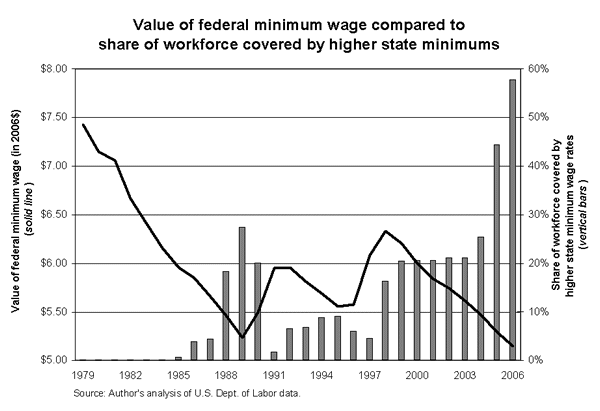See Snapshots Archive.
Snapshot for July 26, 2006.
Federal inaction forces states to raise minimum wages
By EPI policy analyst Mary Gable
The minimum wage is a measure of how we value work in this country. It should reflect a deal society makes with every worker in America that, if you work hard and play by the rules, then you are entitled to a decent day’s wages for a decent day’s work.
States across the country are raising the minimum wage through legislative action and ballot initiative. Recognizing the inadequacy of the federal level set in 1997, the states continue to lead the charge to protect low-wage workers. In total, 22 states and the District of Columbia have enacted minimum wages greater than the federally mandated level. This year alone eight states have raised their minimum wage. Fifty-eight percent of the national population now lives in states that have, or are about to have, minimum wages higher than the federal level (see the chart below).

Since the last federal increase in September 1997, the purchasing power of the minimum wage has deteriorated by 20% (after accounting for inflation) and is actually at its lowest value since 1955. In response, this year state legislatures in Arkansas, Maryland, Michigan, North Carolina, and Pennsylvania increased their minimum wages above the federal level for the first time. Maine, Delaware, and Rhode Island (states with minimum rates already above the federal level) have passed additional increases this year.
Legislation to increase the minimum wage is also currently moving forward in California and Massachusetts. On July 21, Massachusetts Governor Mitt Romney vetoed a minimum wage increase that would raise it to $8 over the course of two years, but his veto faces an override in the state legislature. Voters are also forcing wage increases through ballot initiative. Initiatives in Arizona, Montana, and Nevada have qualified for this year’s ballot. With necessary petition signatures already submitted, the Missouri minimum wage ballot initiative is close to its official qualification. Colorado and Ohio are likely to have ballot initiatives this year, too.
Nationwide, in the face of federal inaction, legislators and voters alike are responding to workers’ calls for a fair minimum wage.
